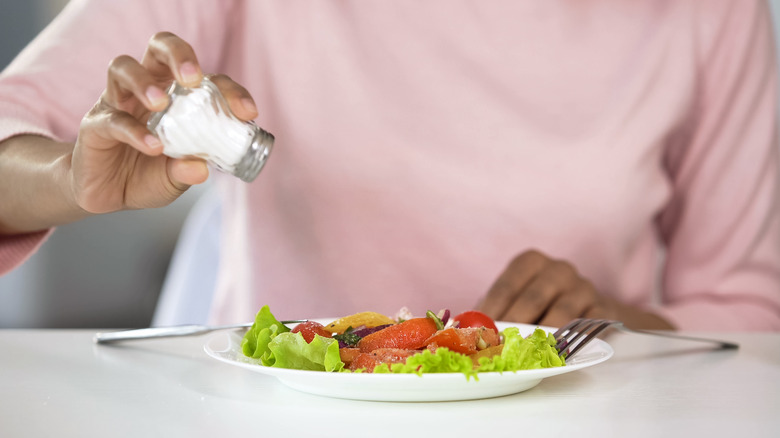New Study Reveals The Real Risks Of Adding Salt To Your Food
A recent study published in the European Heart Journal might have you thinking twice before reaching for the shaker of salt. The new study suggests that there may be a link between adding salt to meals and an increased risk of premature death, per The Guardian. Led by Professor Lu Qi of Tulane University School of Public Health and Tropical Medicine in New Orleans, the study followed over 500,000 middle-aged men and women for an average of nine years. Researchers asked the participants to answer how often they added salt to their food at the table.
While the study did not account for salt added during the cooking process, the findings indicated that individuals who always added more salt to their food were at a 28% higher risk of premature death, which was defined as passing away before the age of 75, according to Science Daily. Men showed a reduced life expectancy of 2.3 years by age 50, while women's life expectancy dropped by 1.5 years. Qi explained that, "In the Western diet, adding salt at the table accounts for 6-20% of total salt intake and provides a unique way to evaluate the association between habitual sodium intake and the risk of death."
A silver lining for those who enjoy adding salt
Though the headline linking increased salt consumption to premature death is bleak, there is a bit of good news. Researchers said the risk appeared to be slightly lowered in individuals with diets high in fruits and vegetables, per Science Daily. Professor Lu Qi notes that fruits and vegetables can be great sources of potassium, which has "protective effects" and can help lower the risk of early death. However, he did cautioned that, "because our study is the first to report a relation between adding salt to foods and mortality, further studies are needed to validate the findings before making recommendations."
One of the challenges with calculating the right amount of sodium for the human body is that you don't want to estimate too low of an amount, according to Annika Rosengren, a professor at the University of Gothenburg who did not take part in the study (via The Guardian). Sodium is an essential nutrient that the body requires, and the amount needed varies by person. Qi says the overall study seems to show that, "Even a modest reduction in sodium intake, by adding less or no salt to food at the table, is likely to result in substantial health benefits, especially when it is achieved in the general population."
If you are thinking about ways to cut your sodium intake, we've looked into what you can substitute for salt.

